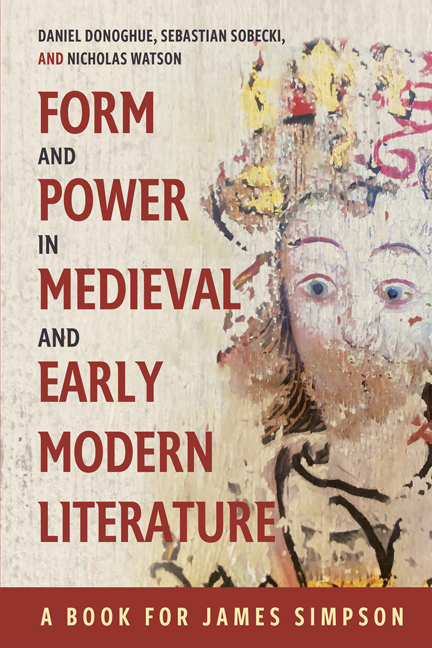Book contents
- Frontmatter
- Contents
- List of Illustrations
- Contributors and Editors
- Acknowledgments
- List of Abbreviations
- Simpson: An Interim Report
- PART I THE HERMENEUTICS OF RECOGNITION
- PART II GENRE AND FIGURE
- PART III CULTURE AND INSTITUTIONS
- PART IV REFORMATIONS
- James Simpson’s Publications from 1984 to 2024
- Bibliography
- A Note on the Bloomfield Conferences
- General Index
- Tabula Gratulatoria
4 - “Troilus can afford to fall in love … with whomsoever he will”: Free Will and Recognition in Troilus and Criseyde
Published online by Cambridge University Press: 17 May 2024
- Frontmatter
- Contents
- List of Illustrations
- Contributors and Editors
- Acknowledgments
- List of Abbreviations
- Simpson: An Interim Report
- PART I THE HERMENEUTICS OF RECOGNITION
- PART II GENRE AND FIGURE
- PART III CULTURE AND INSTITUTIONS
- PART IV REFORMATIONS
- James Simpson’s Publications from 1984 to 2024
- Bibliography
- A Note on the Bloomfield Conferences
- General Index
- Tabula Gratulatoria
Summary
In his important discussion of Chaucer's Criseyde in Reform and Cultural Revolution, James Simpson offers the aside that provides my title quotation. “However painful it finally turns out to be,” he observes, Troilus possesses a freedom profoundly different from the circumstances that constrain Criseyde. Contrasting Troilus's immediate vision of love with her painful decision-making, he establishes the former's comparative social freedom as a foil to his real focus: the intense psychological narrative of Criseyde's “shrewd appraisal of the conditions in which she finds herself.” I will return to James's account of Criseyde shortly; but despite its brevity, I want to engage with this comment on Troilus's limited and painful freedom, and with James's work elsewhere on the concept of recognition, to propose this observation as a rather unexpected departure point: toward a theory of human love, and a changed understanding of tragedy. By a “theory of human love,” I mean the model of a freely willed, mutually self-constituting bond between individual, non-substitutable human beings; and when I say “toward,” I mean to suggest that lacking such a culturally sanctioned model, Chaucer responded to human reality with a radical experiment. That experiment, rooted in the freedom of the will and the ethical necessity of recognition, performed an act of transformation upon his sources: and so he also, I will argue, created a new form of tragedy.
There were of course many culturally sanctioned theories of love in the Middle Ages. Perfect divine love was idealized for humanity as universal caritas for God and neighbour; Aristotle's highest form of love between persons, philia, a relation between “men who are good, and alike in virtue,” had with Aquinas been Christianized as the necessary inclination of the soul toward the good, a participant in the greater love that leads to God. Responding to Cicero's classic treatise on friendship, Aelred of Rievaulx's On Spiritual Friendship defined love as “quidam animae rationalis affectus” (“a particular affection of the rational soul”), which in its highest form (“spiritual” as opposed to “carnal” and “worldly”) “inter bonos vitae, morum studiorumque similitudo conglutinat” (“is cemented between the good by similitude of life, morals and pursuits”).
- Type
- Chapter
- Information
- Form and Power in Medieval and Early Modern LiteratureA Book for James Simpson, pp. 67 - 84Publisher: Boydell & BrewerPrint publication year: 2024

